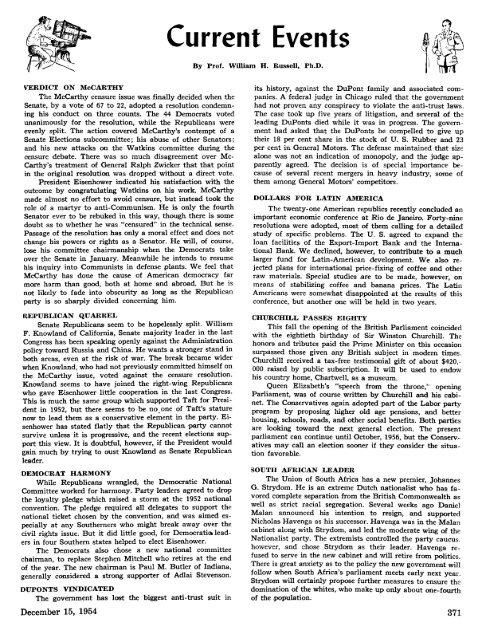Covenanter Witness Vol. 53 - Rparchives.org
Covenanter Witness Vol. 53 - Rparchives.org
Covenanter Witness Vol. 53 - Rparchives.org
You also want an ePaper? Increase the reach of your titles
YUMPU automatically turns print PDFs into web optimized ePapers that Google loves.
Current EventsBy Prof. William H. RusseU, Ph.D.verdict on McCarthyThe McCarthy censure issue was finally decided when theSenate, by a vote of 67 to 22, adopted a resolution condemning his conduct on three counts. The 44 Democrats votedunanimously for the resolution,while the Republicans wereevenly split. The action covered McCarthy's contempt of aSenate Elections subcommittee; his abuse of other Senators;and his new attacks on the Watkins committee during thecensure debate. There was so much disagreement over McCarthy's treatment of General Ralph Zwicker that that pointin the original resolution was dropped without a direct vote.President Eisenhower indicated his satisfaction with theoutcome by congratulating Watkins on his work. McCarthymade almost no effort to avoid censure, but instead took therole of a martyr to anti- Communism. He is only the fourthSenator ever to be rebuked in this way, though there is somedoubt as to whether he was "censured" in the technical sense.Passage of the resolution has only a moral effect and does notchange his powers or rights as a Senator. He will, of course,lose his committee chairmanshipwhen the Democrats takeover the Senate in January. Meanwhile he intends to resumehis inquiry into Communists in defense plants. We feel thatMcCarthy has done the cause of American democracy farmore harm than good, both at home and abroad. But he isnot likely to fade into obscurity as longparty is so sharply divided concerning him.REPUBLICAN QUARRELas the RepublicanSenate Republicans seem to be hopelesslysplit. WilliamF. Knowland of California, Senate majority leader in the lastCongress has been speaking openly against the Administrationpolicy toward Russia and China. He wants a stronger stand inboth areas, even at the risk of war. The break became widerwhen Knowland, who had not previously committed himself onthe McCarthy issue, voted against the censure resolution.Knowland seems to have joined the right-wing Republicanswho gave Eisenhower little cooperation in the last Congress.This is much the same group which supported Taft for President in 1952, but there seems to be no one of Taft's staturenow to lead them as a conservative element in the party. Eisenhower has stated flatly that the Republican party cannotsurvive unless it is progressive, and the recent elections support this view. It is doubtful, however, if the President wouldgain much by trying to oust Knowland as Senate Republicanleader.DEMOCRAT HARMONYWhile Republicans wrangled, the Democratic NationalCommittee worked for harmony. Party leaders agreed to dropthe loyalty pledge which raised a storm at the 1952 nationalconvention. The pledge required all delegates to support thenational ticket chosen by the convention, and was aimed especially at any Southerners who might break away over thecivil rights issue. But it did little good, for Democratic* leaders in four Southern states helped to elect Eisenhower.The Democrats also chose a new national committeechairman, to replace Stephen Mitchell who retires at the endof the year. The new chairman is Paul M. Butler of Indiana,generally considered a supporterstrong of Adlai Stevenson.DUPONTS VINDICATEDThe government has lost the biggest anti-trust suit inDecember 15, 1954its history, against the DuPont familyand associated companies. A federal judge in Chicago ruled that the governmenthad not proven any conspiracy to violate the anti-trust laws.The case took up five years of litigation, and several of theleading DuPonts died while it was in progress. The government had asked that the DuPonts be compelled to give uptheir 18 per cent share in the stock of U. S. Rubber and 23per cent in General Motors. The defense maintained that sizealone was not an indication of monopoly, and the judge apparently agreed. The decision is of special importance because of several recent mergers in heavy industry, some ofthem among General Motors' competitors.DOLLARS FOR LATIN AMERICAThe twenty-one American republics recently concluded animportant economic conference at Rio de Janeiro. Forty-nineresolutions wereadopted, most of them calling for a detailedstudy of specific problems. The U. S. agreed to expand theloan facilities of the Export-Import Bank and the International Bank. We declined, however, to contribute to a muchlarger fund for Latin-American development. We also rejected plans for international price-fixing of coffee and otherraw materials. Special studies are to be made, however, onmeans of stabilizing coffee and banana prices. The LatinAmericans were somewhat disappointed at the results of thisconference, but another one will be held in two years.CHURCHILL PASSES EIGHTYThis fall the opening of the British Parliament coincidedwith the eightieth birthday of Sir Winston Churchill. Thehonors and tributes paid the Prime Minister on this occasionsurpassed those given any British subject in modern times.Churchill received a tax-free testimonial gift of about $420,-000 raised by public subscription. It will be used to endowhis country home, Chartwell, as a museum.Queen Elizabeth's "speech from the throne,"openingParliament, was of course writtenby Churchill and his cabinet. The Conservatives again adopted part of the Labor partyprogram by proposing higher old age pensions, and betterhousing, schools, roads, and other social benefits. Both partiesare looking toward the next general election. The presentparliament can continue until October, 1956, but the Conservatives may call an election sooner if theytion favorable.SOUTH AFRICAN LEADERconsider the situaThe Union of South Africa has a new premier, JohannesG. Strydom. He is an extreme Dutch nationalist who has favored complete separation from the British Commonwealth aswell as strict racial segregation. Several weeks ago DanielMalan announced his intention to resign, and supportedNicholas Havenga as his successor. Havenga was in the Malancabinet along with Strydom, and led the moderate wingof theNationalist party. The extremists controlled the party caucus.however, and chose Strydom as their leader. Havenga refused to serve in the new cabinet and will retire from politics.There is great anxiety as to the policy the new government willfollow when South Africa's parliament meets early next year.Strydom will certainly propose further measures to ensure thedomination of the whites, who make up only about one-fourthof the .population.371
















